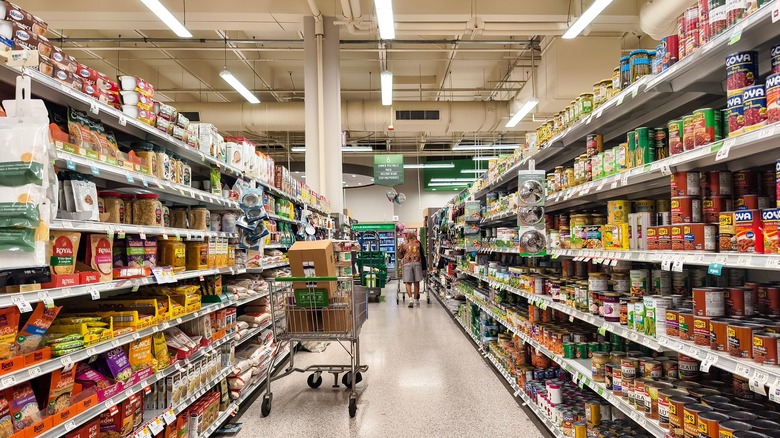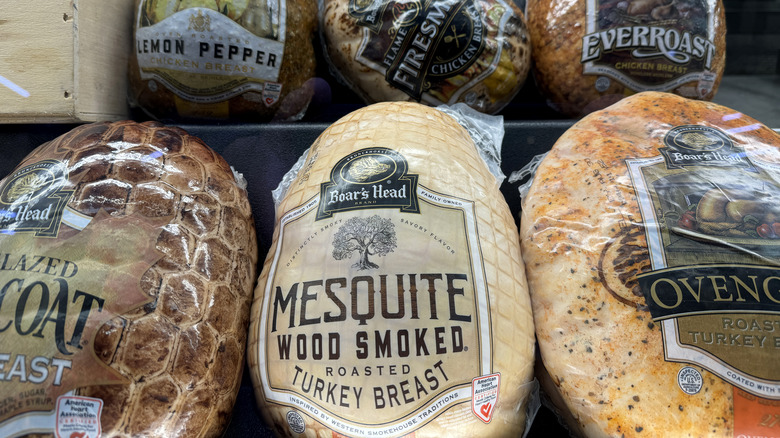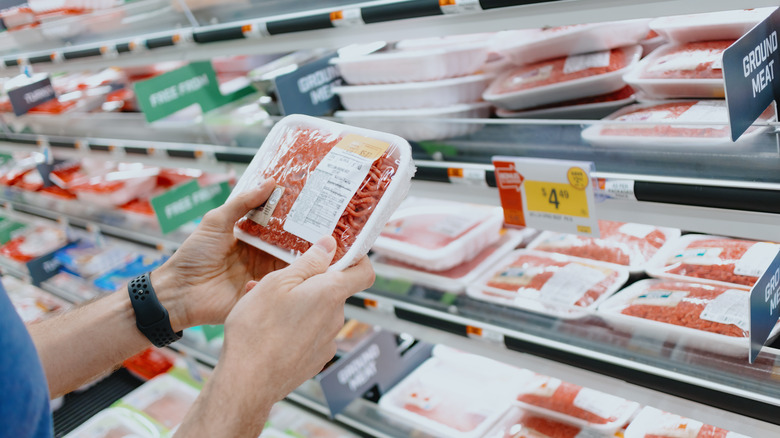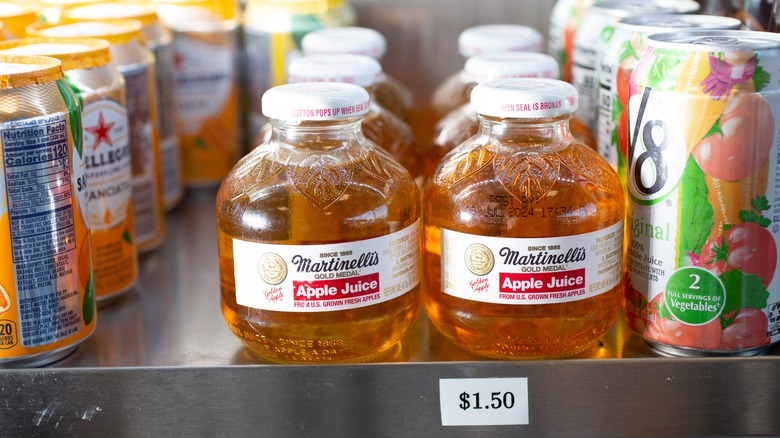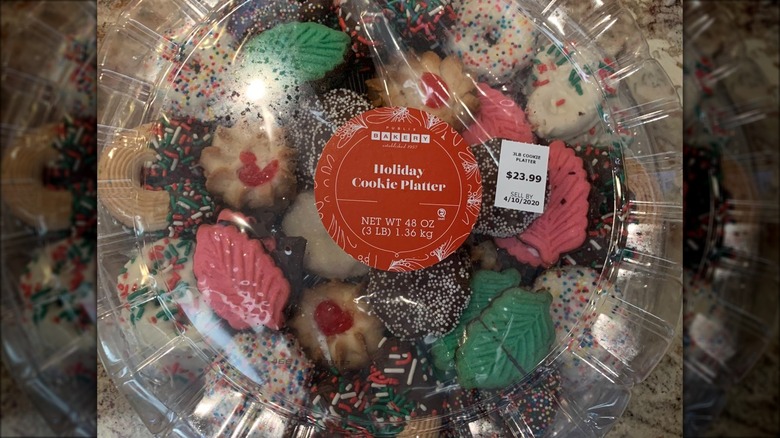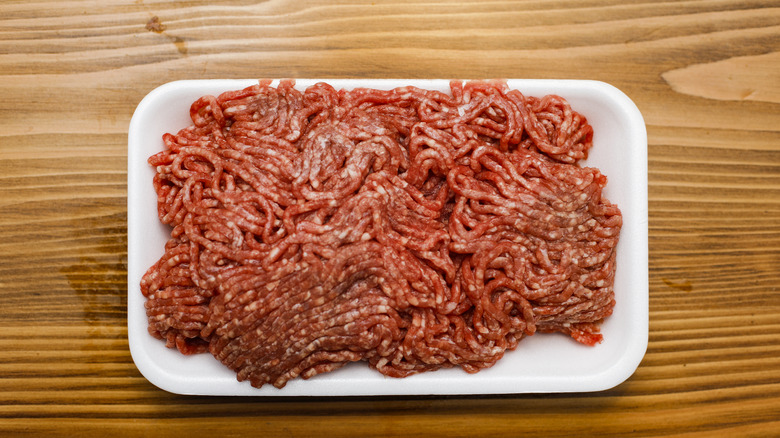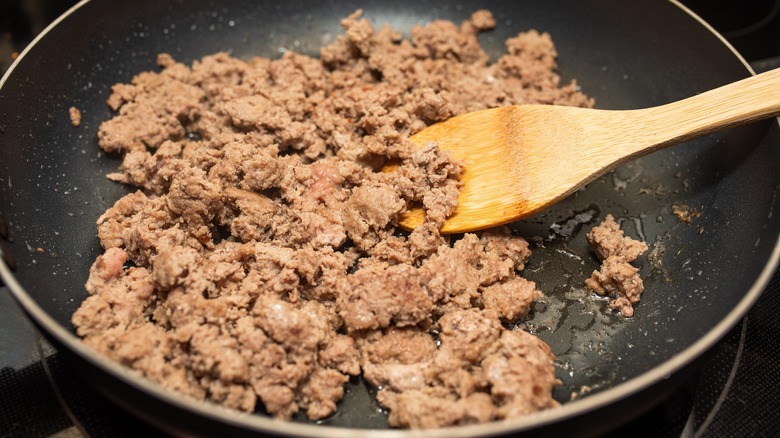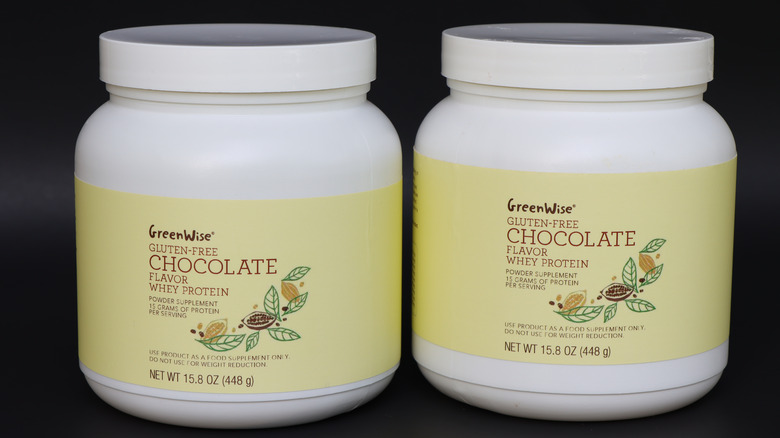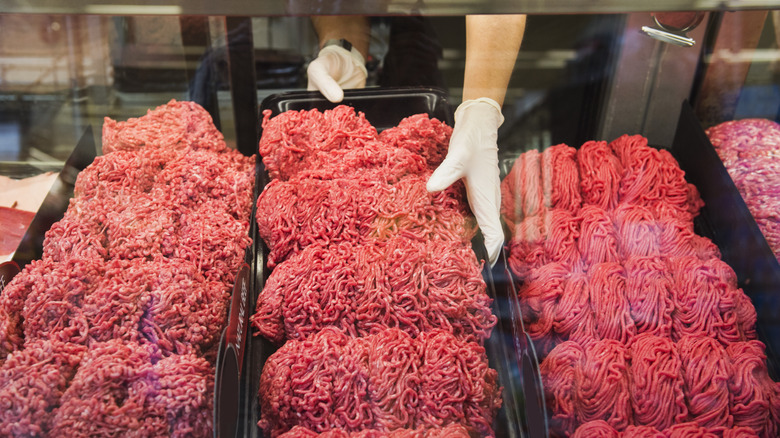The Biggest Recalls In Publix History
It would be tough to find a grocery store chain with a more ardent following than Publix. Founded and based in Florida with stores dotted around Georgia, Alabama, South Carolina, Tennessee, North Carolina, Virginia, and Kentucky, Publix has a reputation for being generous towards its employees (it's the largest employee-owned company in the U.S.) and retaining customers with a combo of solid service and unbeatable deli sandwiches.
But for all its strengths, Publix still suffers from the same obstacles as any other grocery store. Recalls are an industry-wide issue that even the most beloved store can't avoid. Whether it's down to contamination or mislabelling, it's not uncommon for products to be pulled from the shelves. In the past, we've seen Publix recall thousands of units at a time in an effort to mitigate the risk they may pose to its customers. While it's true that every recall is a lesson learned, the reality is that we'll likely see thousands more follow suit in the future, such is the way of the food industry. We've dug through Publix's history to single out its biggest recalls over the years.
Boar's Head deli meat (2024)
In July 2024, the worst listeria outbreak to hit the U.S. since 2011 began. Listeria — a bacterial infection that can cause serious illness for the young, old, and immunocompromised — was found to have tainted deli meats manufactured by Boar's Head and sold at multiple grocery store chains, including Publix. What started with over 207,000 pounds of Boar's Head products blew up to over 7 million additional pounds, covering everything made at its facility in Jarratt, Virginia, where inspection reports from the USDA's Food Safety and Inspection Service (FSIS) previously found mold, mildew, and insects.
As the outbreak spread, at least 57 people were hospitalized, and nine people sadly died across 18 states. With some people taking as long as 10 weeks to show symptoms of infection (technically known as listeriosis), these likely aren't the final numbers. Customers were encouraged to check their refrigerators to ensure that no listeria-ridden products were unknowingly festering in their kitchens, with the affected items bearing sell-by dates into October 2024. Several of those affected have since filed lawsuits against Boar's Head, including 88-year-old Sue Fleming, who was hospitalized for over a week, and Ashley Solberg, whose case claimed that she nearly lost her unborn child as a result of consuming the contaminated meat.
Emerald Kettle glazed walnuts (2024)
As per the Food Allergen Labeling and Consumer Protection Act of 2004, all foods containing major food allergens need to list said allergens in English in their ingredients list. Failing to include the appropriate allergens has sparked multiple recalls at grocery stores over the years, with Publix being one of them in August 2024.
Technically speaking, Flagstone Foods, LLC. was the business behind this recall. Floridian shoppers at Publix — whose stores in the Sunshine State, plus Alabama and Georgia, had received the affected nuts — complained that Emerald Kettle Glazed Walnuts contained peanuts, almonds, and pecans that weren't mentioned on the packaging. After an investigation, it was found that there'd been a mishap during the manufacturing process that led to the walnuts receiving the wrong labels.
Anyone with walnuts featuring a best-by date of June 28, 2025, was asked to follow the usual protocol of either returning or trashing affected products. Considering the nature of this recall, Publix also stressed the risk the nuts could pose to some customers. "People who have an allergy or severe sensitivity to peanuts, almonds, and pecans run the risk of serious or life-threatening allergic reactions if they consume or are exposed to the product from the impacted lot number," it said in a public statement (via Miami Herald).
Publix ground beef products (2024)
Multiple ground beef products were recalled by Publix in June 2024. This time, it wasn't bacteria that kicked the chain into action but the possibility of "foreign material" in 13 products produced at its Venice, Florida, location in Jacaranda Commons Shopping Center, each featuring a sell-by date between June 20 and June 28, 2024. Publix shoppers were warned to either throw away the beef or return it for a refund ASAP.
Coincidentally, this was the second ground beef recall to hit Publix in a matter of weeks. At the end of May, the chain was also forced to recall a separate batch of Market Ground Beef produced at a different store at The Village at Flynn Crossing in Alpharetta, Georgia, due to something ending up in the meat that shouldn't. This recall was slightly smaller, only impacting products with a sell-by date of May 30, 2024. In neither case did Publix confirm what this "foreign material" may be or whether someone had actually found said material in their food, but better safe than sorry.
Green Life Farms baby arugula (2024)
The summer of 2024 was a busy time for Publix recalls. On May 31, the chain was hit by a recall from Green Life Farms, which revealed that its baby arugula may be contaminated with salmonella bacteria after conducting a routine test on one of its harvests.
For most people, salmonella can cause infections that lead to diarrhea, fever, and stomach cramps in as little as eight hours. Those considered vulnerable can contract a much more serious infection, potentially even causing death. With that in mind, it's no surprise that all products from that harvest were recalled from select Publix stores. This impacted 4-ounce containers with a sell-by date of June 15, 2024, all of which customers were asked to throw away or return to Publix. No illnesses were reported, and with Green Life Farms reportedly taking corrective action, no further harvests were affected either.
Martinelli's apple juice (2024)
As a general rule, "poison" plus "food and drink" equals "bad." That's why, when the State of Maryland discovered that samples of Martinelli's Gold Medal apple juice contained 11.6 parts per billion (ppb) of arsenic — 1.6 ppb more than the FDA's limit of 10 ppb – in April 2024, the brand issued an urgent recall for 25,000 cases of juice. This affected multiple grocery stores, including Publix.
The list of possible health risks that come with arsenic exposure is alarming, with the World Health Organization (WHO) claiming that it's been linked to cardiovascular disease, diabetes, cancer, and skin lesions in the long run. The side effects of short-term exposure are also pretty horrifying, with vomiting, diarrhea, chest pain, and low blood pressure just some of the symptoms that can emerge in as little as 30 minutes. Fortunately, nobody reported any illnesses as a result of drinking the apple juice, but when it comes to arsenic, we'd personally rather throw out our apple juice than take the risk.
Publix holiday cookie platters (2020)
Anyone who's spent December in the vicinity of a Publix can attest to the fact that its holiday cookie platters are as much a part of the season as Santa and snowmen. In 2020, however, one platter was unexpectedly pulled from stores in Florida (with the exception of Miami-Dade, Palm Beach, Broward, and Monroe counties), Georgia, Alabama, Tennessee, South Carolina, North Carolina, and Virginia due to concerns over one surprise ingredient.
As per the U.S. Food and Drug Administration, the platters ran the risk of containing undisclosed pecans after "a temporary breakdown in the company's packaging processes." Like all nuts, this posed a potentially very dangerous — if not deadly — problem to those with serious nut allergies. No illnesses were reported, but had the recall not gone ahead, there was every chance that these cookies could have fallen into the wrong hands with disastrous consequences.
Rock Garden basil (2019)
As far as foodborne illnesses go, cyclospora is one of the more rare infections to contract. The parasite — which can infect the small intestine and cause serious stomach pain, diarrhea, and nausea, sometimes for months at a time – triggered an outbreak across Connecticut, Florida, Georgia, Indiana, Massachusetts, Minnesota, New York, Ohio, Rhode Island, South Carolina, and Wisconsin in summer 2019. At least 132 people fell ill in the process, with four hospitalized.
Upon an investigation by the Centers for Disease Control and Prevention (CDC), it was decided that the outbreak was most likely linked to fresh basil exported by Siga Logistics de RL de CV in Morelos, Mexico. Rock Garden organic basil was subsequently pulled from Publix, and customers were encouraged not to eat any products containing raw basil — such as pesto — unless they could 100% confirm that it didn't contain greens from Siga Logistics.
Publix ground beef products (2018)
A massive recall hit a long list of ground beef products at Publix in August 2018. The products in question spanned everything from bacon and fried onion meatballs to Montreal seasoned chuck burgers at Publix stores in select Florida counties, all for the same reason: contamination. After the FSIS was made aware of an E. coli outbreak, it traced it back to Publix's ground beef. While the FSIS only became aware of the outbreak in August, the 18 known victims — most of whom were from Florida — all fell ill between July 5 and July 25, 2018, after eating ground chuck products that they'd purchased at various Publix locations.
Similar to salmonella and cyclospora, the main symptoms of an E. coli infection are diarrhea, stomach pain, nausea, and vomiting. Most people recover in a matter of days, but some cases are so extreme that sufferers experience dehydration or bloody diarrhea, hence hospitalization. Unsurprisingly, Publix was quick to encourage customers to check their freezers, just in case they unknowingly possessed meat with the ability to inflict a similar fate. "We have been working closely with various federal agencies as we share the common goal of maintaining food safety and public health," said Maria Brous, Publix's media and community relations director (via Publix). "We urge our customers to make sure they no longer have ground chuck products purchased in the affected Florida counties from June 25 through July 31 in their freezers."
Publix ground turkey (2017)
Publix's ground turkey sparked contamination fears in 2017. Unlike incidents involving ground beef, however, this wasn't contamination of the bacterial kind. Instead, Publix was caught up in a recall by Prestage Foods, which had revealed that two of the grocery chain's products may contain tiny pieces of shaved metal.
Announced on October 2, 2017, the recall claimed that a Prestage Foods worker had first raised the alarm over potential foreign object contamination while cleaning processing equipment on September 27. That same day, a grocery store employee noted that they'd seen metal shavings in a package of ground turkey. A whopping 38,475 pounds of turkey were recalled altogether, spanning two Publix products (Publix ground turkey breast with natural flavorings and Publix ground turkey with natural flavorings) and two other offerings sold under the banners Fit & Active and Weis Markets). Nobody fell ill, but the recall was defined as a Class II by the Food Safety and Inspection Service, meaning it is "a health hazard situation where there is a remote probability of adverse health consequences from the use of the product."
GreenWise protein powders (2016)
In August 2016, several flavors of GreenWise protein powders disappeared from Publix shelves in Florida, Georgia, South Carolina, Alabama, and Tennessee. Both the 13-ounce size vanilla and the 15.5-ounce size chocolate varieties of the whey powder were temporarily scrapped for one very important reason.
For the majority of Publix customers, purchasing and consuming these protein powders wouldn't have had an adverse effect on your health. The issue was with select customers with allergies or sensitivities to dairy. Milk was found to be present in both the vanilla and chocolate protein powders, despite the fact it wasn't mentioned as an allergen on the packaging. Anyone who had already bought the protein powder was given the option of either returning or throwing away their purchase and getting a full refund. While we're sure many customers didn't do this, the good news is that nobody reported any illnesses from consuming either protein powder.
45 flavors of Publix cake (2012)
The question isn't which Publix cakes were recalled in 2012 but which ones weren't. In November of that year, Publix stores removed 45 varieties of cake from their shelves because they were potentially contaminated with one of the food industry's greatest enemies: listeria monocytogenes. The bacteria was feared to be present in Publix's chocolate ganache, latte blast, raspberry sacher torte, and peanut butter fudge fix cakes, plus many more.
Publix was nudged into a recall after receiving a notification from Publix supplier Maplehurst, which had identified the contamination. Only stores in select counties of Publix's home state, Florida, were affected, with the chain pulling all at-risk items from the shelves and encouraging anyone who had shopped at the store between November 11 and November 15, 2012, to resist sugary temptation and return any relevant baked goods for a full refund.
Publix round top sundae cones (2009)
The recall of Publix's round top sundae cones had nothing to do with the actual cones themselves. Instead, it was the peanuts that adorned each individual sundae cone that gave the grocery store the headache of becoming embroiled in a series of nationwide recalls in January 2009.
These peanuts were produced by the Peanut Corp. of America, which was embroiled in a salmonella controversy from late 2008 onwards. Over 700 people fell ill, and nine people died, with the outbreak proving so serious (and the list of recalls so lengthy) that the company ultimately filed for bankruptcy in February 2009. This followed accusations from the FDA that the Peanut Corp. of America had known about the presence of salmonella in its Georgia factory for years and had engaged in a practice known as "lab shopping" to try and garner the necessary negative lab results to ship products, which the company denied (via CNN).
Before the Peanut Corp. of America went down, it pulled Publix into its mess when the grocery store's round top sundae cones became one of 3,913 recalled products thanks to their chopped peanuts topping. As per usual, customers were given the choice of returning their purchase to a Publix store or relegating it to a trash bag — although, considering the mass peanut panic that was sweeping the nation at that point, we wouldn't be surprised if many had already done the latter.
Publix apple, pineapple and pumpkin empanadas (2008)
Publix (sadly) doesn't offer its apple, pineapple and pumpkin empanadas anymore, but back when it did, it was forced to recall the baked turnovers after realizing a critical mistake had been made during the packaging process. Empanadas sold in packs of two and four at Publix's in-store bakeries had been mislabeled, leading to the omission of milk as an allergen.
The problem didn't impact all stores, however, it still spanned Publix stores in specific counties across Georgia, Florida, and Tennessee. "The packaging error was detected during a routine label review," explained Maria Brous, Publix's media and community relations director (per Progressive Grocer). "As part of our commitment to food safety, we routinely inspect our product labeling for accuracy and for product quality." Publix urged customers not to eat the empanadas and instead dispose of them and ask for a refund.
Publix water (2020)
You can't go wrong with water, right? Wrong. As it turns out, there are plenty of reasons why a grocery store may need to withdraw its water offerings. Publix decided to do so in the late 2000s after one Florida woman poured some water for her daughter and spotted "junk floating around" (via Water World).
As per Publix, the "junk" was nothing more than "harmless, non-pathogenic mold" that may not be aesthetically pleasing but isn't detrimental to your health. However, the customer in question didn't necessarily agree, with her complaint sparking a wider investigation that later led to the supermarket stripping all bottles packaged at its bottling plant in Deerfield. To clear its name (and water) in the eyes of customers, Publix had the mold tested separately, where it reportedly found no health hazard.
Spokesperson Carmen Millares confirmed that Publix had removed the bottles from its 184 stores in Miami, all of which are served by the Deerfield plant. "We had the entire water-bottling system thoroughly cleaned and sanitized, so there no longer is a problem there," Millares said. She also insisted that the water was safe to drink regardless. "It is important for people to understand that this is harmless. Nobody could be hurt by drinking it. The water is good."
Publix ground beef products (1999)
Ground beef was removed from select Publix stores in August 1999 due to an E. coli scare. While nobody had reported illness from any meat purchased at Publix, the chain made the decision after federal inspectors in Atlanta conducted a routine test on a random shipment to a suburban store. This revealed the presence of E. coli bacteria, which can prove deadly and, as we've discussed, has caused plenty of issues for Publix in the years since.
No illnesses were reported as a result of consuming contaminated meat. While both state and federal inspectors got to work trying to figure out how the meat was contaminated in the first place, Publix never confirmed how many products were affected, or how much ground beef had already been shipped to other stores. If anything, this proves how critical strict protocols around product sampling are in order to prevent worst case scenarios for both customers and companies.
